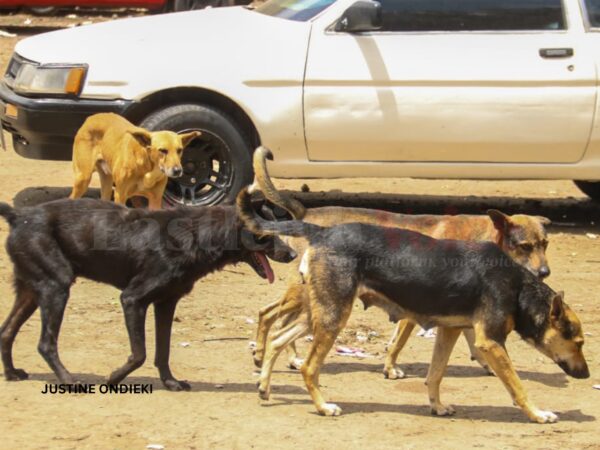Rising stray dog population in Kamukunji spark public health and safety concerns
Locals attribute this to rising piles of uncollected garbage, open landfills and generally unhygienic conditions that attract and sustain the dogs.
Stray dogs have become a growing problem in Kamukunji Constituency, particularly in Eastleigh, Majengo and Kitui village. Residents say what was once a manageable presence has escalated sharply in recent months, posing increasing health and safety risks.
Locals attribute this to rising piles of uncollected garbage, open landfills and unhygienic conditions that attract and sustain the dogs.
More To Read
- Property worth millions destroyed as fire razes shops at Yare Business Park in Eastleigh
- MP Yusuf Hassan pledges to protect public land as intruders break into Maina Wanjigi in attempt to grab land
- Kamukunji faces vaccine crisis as over 12,000 children miss routine immunisation
- Best biriyani in Eastleigh: Esli Hub Restaurant at Yare Towers delivers a flavour explosion
- Residents of Eastleigh’s Seventh Street demand urgent road repairs
- 175 Kamukunji youth receive business equipment from President Ruto to boost employment and income
A tour of the affected areas by The Eastleigh Voice revealed overflowing bins, open dumpsites, and waste strewn in alleys, creating a feeding ground for the dogs. Some dogs follow garbage collectors to scavenge scraps. Residents say this symbiotic relationship between poor waste management and stray animals is fueling the problem.
Duncan Mathew, who has lived along Malanga Street in Highrise-Majengo for over five years, told The Eastleigh Voice that the dog population has grown from a few scattered strays to large groups roaming the streets day and night.
“Where there is food waste in landfills, there will be dogs,” said Mathew. “And in this area, there is food waste everywhere.”
 Stray dogs on Maranga Street in Majengo. (Photo: Justine Ondieki)
Stray dogs on Maranga Street in Majengo. (Photo: Justine Ondieki)
Mathew described how the dogs began marking territories, fighting aggressively, and tearing through garbage piles.
“There used to be just a few dogs that we knew, maybe five or six, and they mostly stayed around our block. We even fed some of them, and they’d bark at suspicious strangers, so we considered them helpful,” he said.
He reported that more than ten dogs now roam neighbourhoods freely, often near schools, markets, and homes, sparking concern among parents and the elderly. He warned that without urgent action, the situation could escalate into a public health crisis.
“They’re everywhere. Some are aggressive, others look sick or diseased. We don’t know where they come from or who to report to. They reproduce in alleys, in garbage piles, even in drainage areas. Every few months, there are new puppies, and it never stops,” said Mathew.
The relationship between residents and the dogs is, however, complex. A section of the residents, like Abdul Mohammed, view some of the dogs as protectors.
 Stray dogs. (Photo: Justine Ondieki)
Stray dogs. (Photo: Justine Ondieki)
“We’ve been with some of these dogs for over ten years,” Abdul told The Eastleigh Voice. “We feed them as a community. They know us and don’t cause trouble. But now, there are more that we don’t recognise. Maybe 15 or more roaming around, and they are the ones causing fear.”
Abdul noted that while no bites have been reported in the area, dogs often chase children returning from school.
“Our biggest concern is that none of these dogs are vaccinated - not even the ones we consider part of the community. We’re scared because if someone is bitten, and the dog has rabies, it could be fatal,” he said.
For many residents, especially women and children, the biggest worry is that none of the dogs are vaccinated, raising fears of rabies infection.
A woman who spoke to The Eastleigh Voice on condition of anonymity said she avoids common walking routes to escape packs that bark, chase people, and block paths.
“When dogs are roaming in groups, it’s terrifying. They bark, chase people, and sometimes block paths. I’ve had to start walking a longer way to get home just to feel safe,” she lamented.
In response, Kamukunji Assistant County Commissioner Mohammed Adu urged residents to report all dog bites immediately and seek medical attention.
 Kamukunji Assistant County Commissioner Mohammed Adu. (Photo: Justine Ondieki)
Kamukunji Assistant County Commissioner Mohammed Adu. (Photo: Justine Ondieki)
“We’ve received several reports regarding stray dog problems - especially in Eastleigh South. It’s one of the most affected areas in Kamukunji. While we have not received formal reports of dog bites, we know the risk is high,” said Mohammed.
According to health expert Esther Mukuhe, any dog bite, no matter how minor, requires urgent treatment to prevent rabies - a deadly virus transmitted through bites or scratches.
Mukuhe advised that in the event of a dog bite, treatment must be sought immediately, no matter how minor the injury appears.
“Never ignore a dog bite,” warned Mukuhe. “Even a small scratch can transmit the rabies virus. The only way to stay safe is to get medical help right away and begin the rabies vaccination process.”
Mukuhe advised that symptoms initially mimic common illnesses such as fever and headache, but rapidly progress to severe neurological problems, including confusion, aggression, hallucinations, and paralysis.
 Stray dogs. (Photo: Justine Ondieki)
Stray dogs. (Photo: Justine Ondieki)
“Rabies is one of the most dangerous viral infections,” said Mukuhe. “But the tragedy is that it’s 100 per cent preventable if action is taken quickly. Once symptoms appear, it is almost always fatal.”
Treatment involves a series of rabies vaccinations, known as Post-Exposure Prophylaxis (PEP), sometimes combined with rabies immunoglobulin. Unfortunately, access to these treatments is often limited in informal settlements.
Rabies is currently recognised by the World Organisation for Animal Health (WOAH) as one of the top five priority zoonotic diseases in Kenya requiring urgent control.
It is prevalent in rural areas, particularly in Machakos, Kitui, and Makueni, as well as Siaya, Kisumu, and Homa Bay. Official data reports between 300 and 400 dog bite cases per 100,000 people annually, but experts warn the true scale is likely much higher due to underreporting.
The World Health Organisation (WHO) estimates around 59,000 rabies deaths annually, mostly in Africa and Asia. Alarmingly, the disease disproportionately affects children under 15 years.
Top Stories Today













































